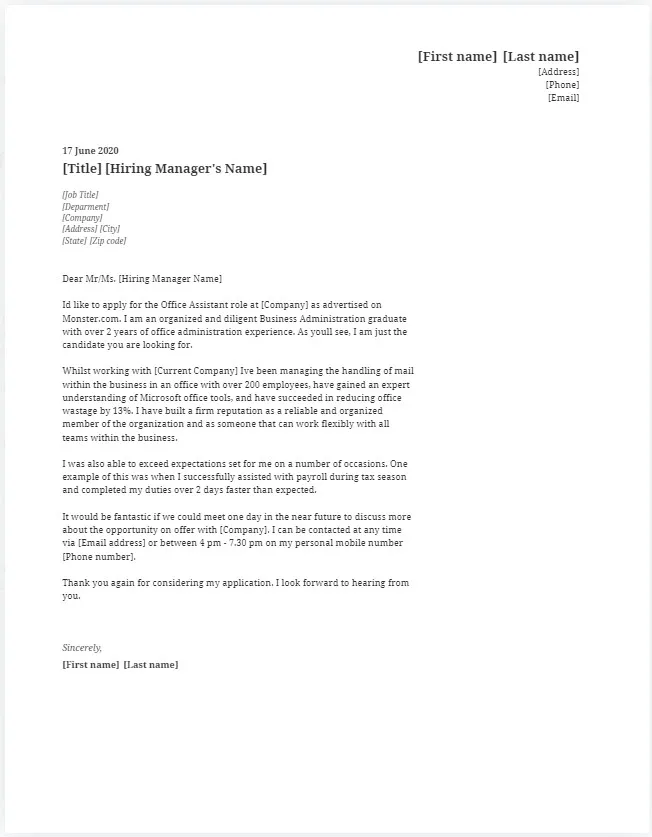Crafting a Compelling Office Assistant Cover Letter
Landing an office assistant role starts with a well-crafted cover letter. This document is your first impression, a chance to showcase your personality, skills, and enthusiasm. It complements your resume, providing context and demonstrating why you’re the perfect fit for the position. A compelling cover letter goes beyond simply listing your qualifications; it tells a story, highlighting your potential contributions to the company. The goal is to capture the hiring manager’s attention and secure an interview. By following the strategies outlined in this guide, you can create a cover letter that stands out and opens doors to your desired office assistant position.
Understanding the Purpose of a Cover Letter
The primary function of a cover letter is to introduce you to a potential employer and explain why you’re interested in the specific role and company. It’s an opportunity to demonstrate your understanding of the job requirements and how your skills and experiences align with those needs. Unlike a resume, which provides a factual overview of your qualifications, the cover letter allows you to express your personality, communicate your career goals, and showcase your written communication skills. It serves as a bridge between your past experiences and the future you envision within the organization.
Highlighting Relevant Skills
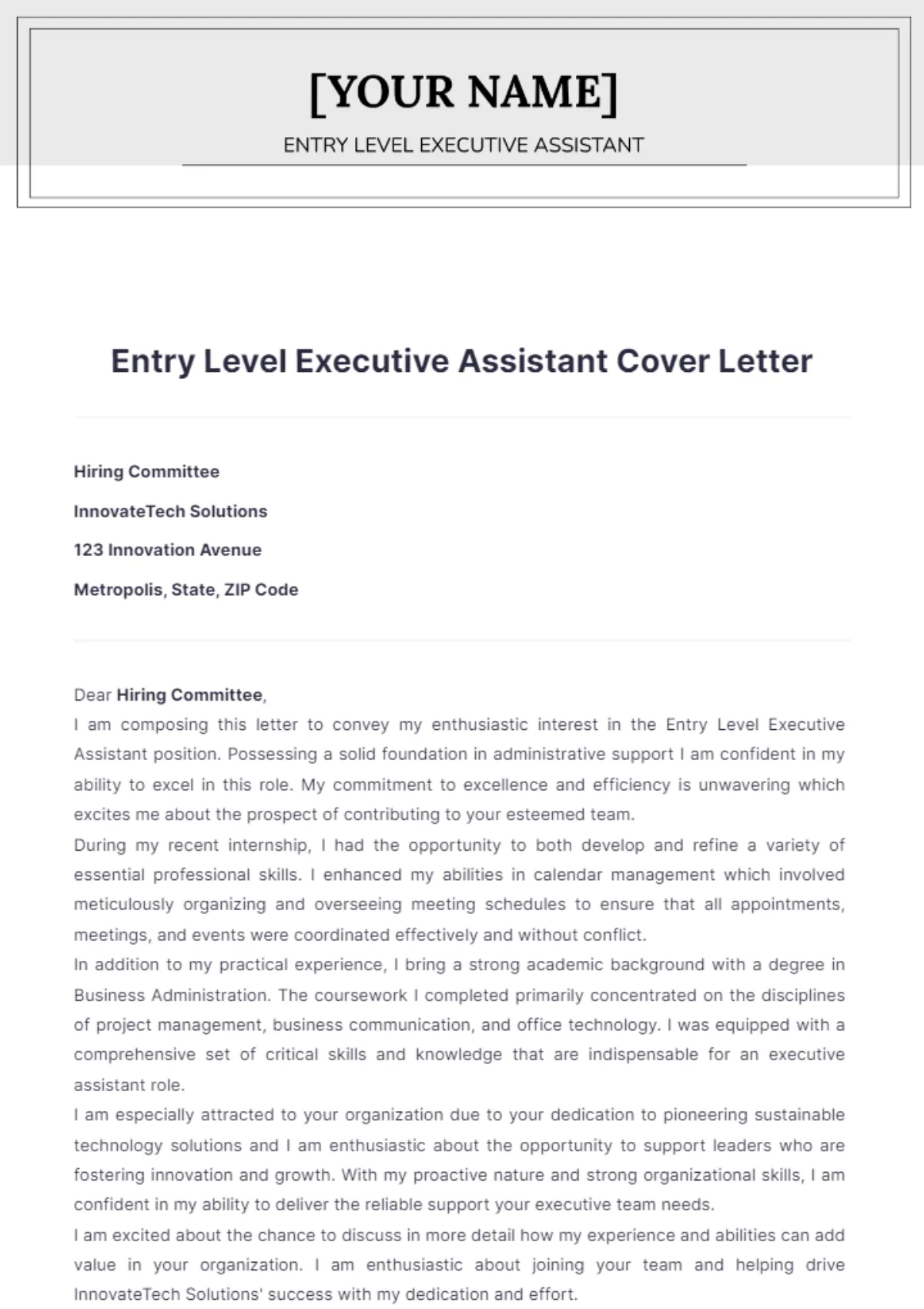
A successful office assistant cover letter emphasizes the skills that make you a strong candidate. Carefully review the job description and identify the key skills the employer is seeking. Then, provide specific examples from your past experiences where you’ve demonstrated those skills. Quantify your achievements whenever possible, using numbers and data to illustrate your impact. For instance, instead of saying ‘managed multiple projects’, state ‘managed five projects simultaneously, completing them under budget and ahead of schedule’. This approach makes your accomplishments more tangible and persuasive.
Essential Skills for Office Assistants
Office assistants require a diverse skill set to manage various administrative tasks efficiently. These skills often include strong communication, organizational abilities, and technical proficiency. Emphasizing these skills in your cover letter demonstrates your ability to succeed in the role and contribute to a productive work environment. Be sure to highlight these essential skills with concrete examples from your past experiences to make your cover letter more persuasive.
Communication Skills
Effective communication is crucial for office assistants. This involves both written and verbal communication skills. In your cover letter, highlight your ability to communicate clearly, concisely, and professionally. Provide examples of how you’ve handled phone calls, emails, and in-person interactions. Mention your experience with drafting correspondence, preparing presentations, or interacting with clients or vendors. Demonstrate your active listening skills and your ability to understand and respond to inquiries effectively.
Organization and Time Management
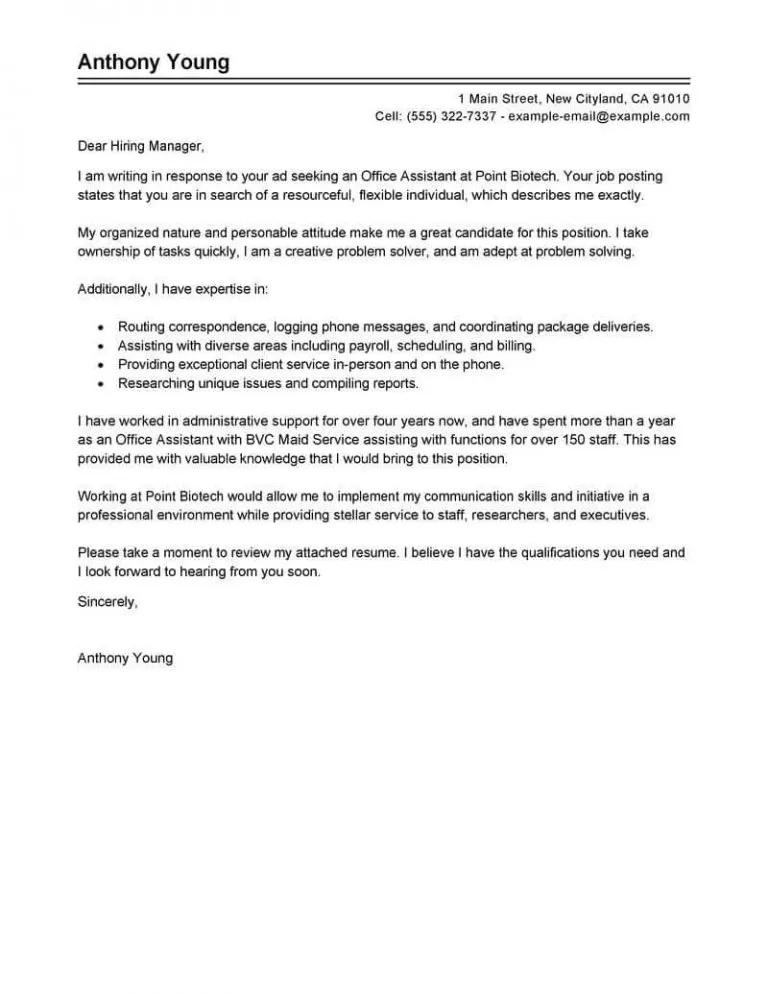
Office assistants must be highly organized and adept at managing their time. Showcase your skills in these areas by describing your ability to prioritize tasks, meet deadlines, and maintain an orderly workspace. Mention any experience you have with scheduling meetings, managing calendars, or organizing files. Highlight your use of productivity tools like to-do lists, project management software, or calendar apps. If you have implemented any systems that improved efficiency, be sure to share those details. A well-organized assistant can significantly improve office productivity.
Technical Proficiency
Modern office environments rely heavily on technology, so technical proficiency is a must. Mention your experience with software programs such as Microsoft Office (Word, Excel, PowerPoint, Outlook), Google Workspace, and any other relevant applications. Specify your typing speed and accuracy. If you have experience with specialized software or databases, be sure to include that information. Familiarity with office equipment such as printers, scanners, and copiers is also beneficial. Emphasize your ability to quickly learn new software and adapt to technological changes.
Showcasing Experience and Achievements
While it’s important to list your skills, it’s even more crucial to demonstrate them through your experiences and achievements. Use the STAR method (Situation, Task, Action, Result) to structure your examples. Start by describing the situation, outline the task you were assigned, explain the action you took, and then highlight the positive result. This method provides a clear and concise overview of your abilities. Focus on accomplishments that showcase your efficiency, problem-solving skills, and ability to contribute to a team. Remember to quantify your achievements whenever possible; for example, state that you reduced filing errors by a certain percentage or improved customer satisfaction scores.
Tailoring Your Cover Letter
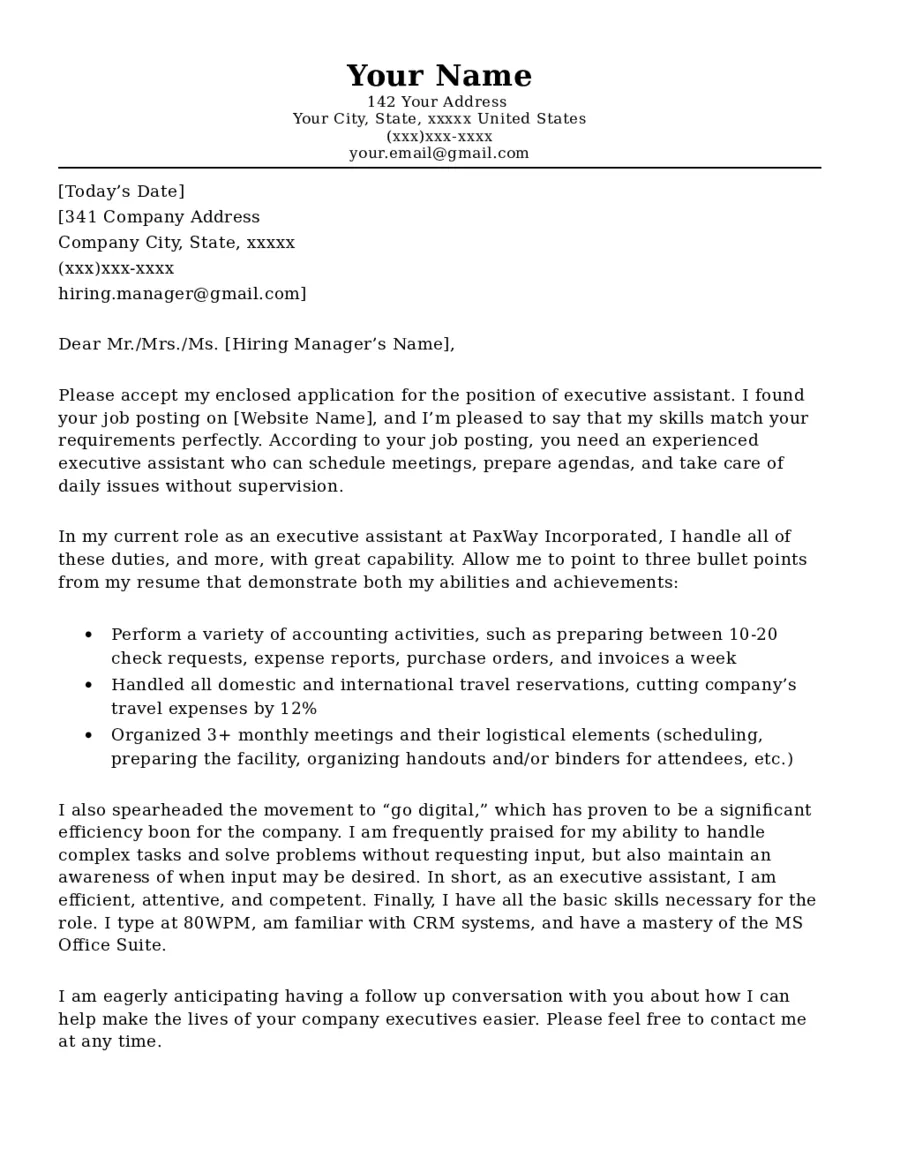
A generic cover letter is unlikely to impress a hiring manager. Tailoring your letter to each specific job and company is essential. This demonstrates your genuine interest in the position and shows that you’ve taken the time to understand the company’s needs. Tailoring involves researching the company, customizing your content, and using the correct format to create a polished document that is highly effective. This will set you apart from other candidates who may be using a generic template.
Researching the Company
Before writing your cover letter, thoroughly research the company. Visit their website, read their ‘About Us’ section, and explore their social media presence. Understand their mission, values, and culture. Identify their recent projects or initiatives. This research will enable you to personalize your cover letter and show the hiring manager that you understand the company’s goals and how your skills can contribute. Mentioning specific details about the company demonstrates that you’ve invested time and effort into your application and are genuinely interested in the opportunity.
Customizing Content
Once you have researched the company, customize your cover letter to align with their specific needs and values. Carefully review the job description and identify the key requirements. Use keywords and phrases from the job posting in your cover letter. Highlight the skills and experiences that directly match the employer’s needs. Explain why you’re particularly interested in working for that specific company and how your goals align with theirs. Tailoring your content shows that you understand the role and are prepared to contribute meaningfully to the organization.
Formatting and Structure
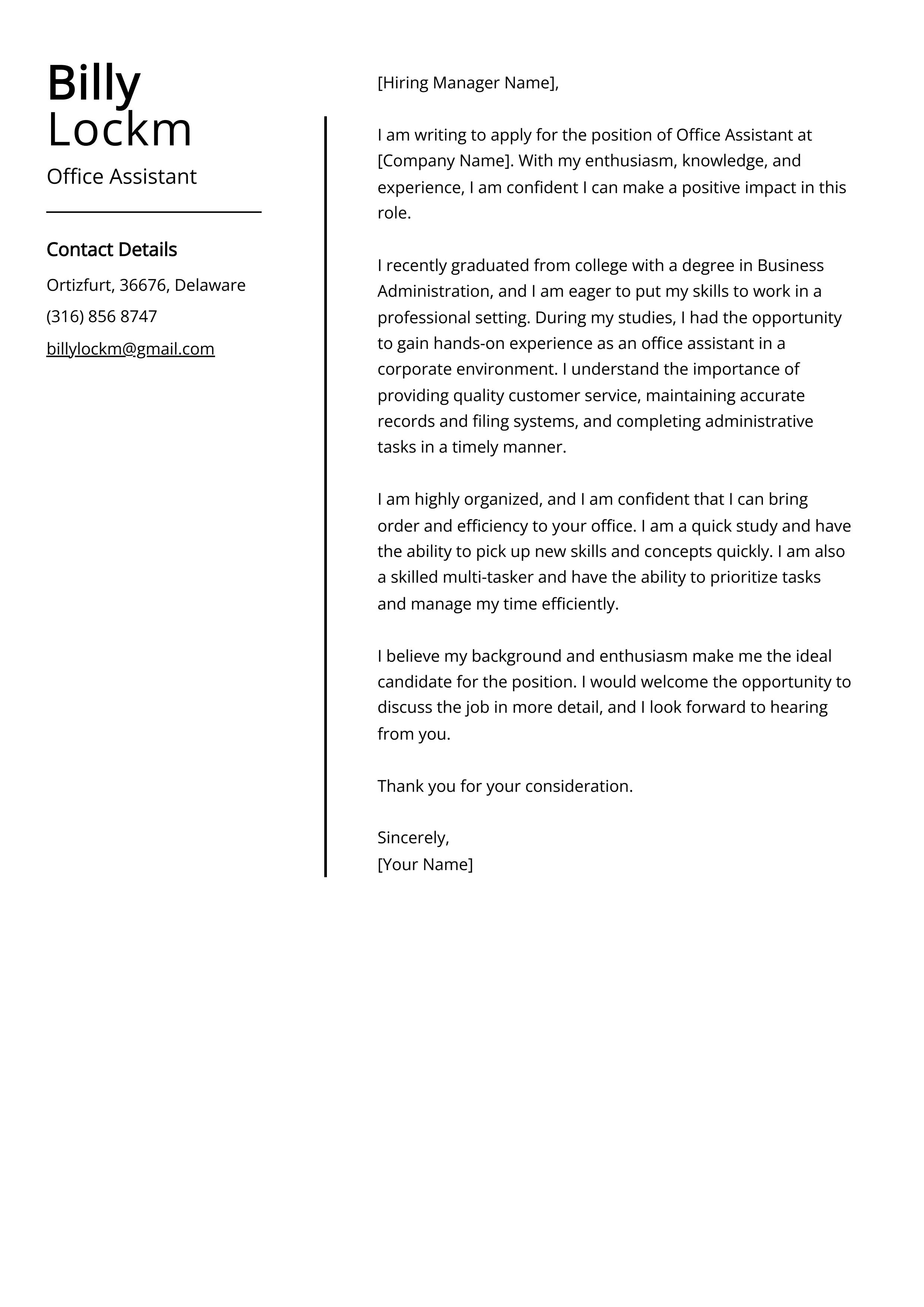
The formatting and structure of your cover letter are crucial for creating a positive first impression. A well-formatted letter is easy to read, professional-looking, and showcases your attention to detail. Use a clear and consistent font, such as Times New Roman or Arial, with a font size of 11 or 12 points. Keep your letter concise, ideally no more than one page. Divide the content into logical sections with clear headings and subheadings to improve readability. Ensure proper spacing and alignment. Use bullet points for lists of skills or achievements to make them stand out. Pay close attention to these elements to ensure a polished appearance.
Contact Information and Salutation
Start your cover letter with your contact information, including your name, address, phone number, and email address. Then, include the date and the hiring manager’s name and title, if available. Address the letter to the hiring manager by name whenever possible, as this shows that you’ve taken the time to research the company. If you cannot find the hiring manager’s name, use a professional greeting like ‘Dear Hiring Manager’. Avoid generic greetings like ‘To Whom It May Concern’.
Body Paragraphs
The body of your cover letter should be well-structured and persuasive. Begin with a strong opening paragraph that immediately grabs the reader’s attention and states your interest in the position. In the following paragraphs, highlight your relevant skills and experiences, providing specific examples to support your claims. Explain why you’re a good fit for the company and what you can contribute. Keep your paragraphs concise and focused. Use active voice and avoid jargon or overly complex language. Demonstrate your enthusiasm for the opportunity and your understanding of the job requirements.
Closing and Call to Action
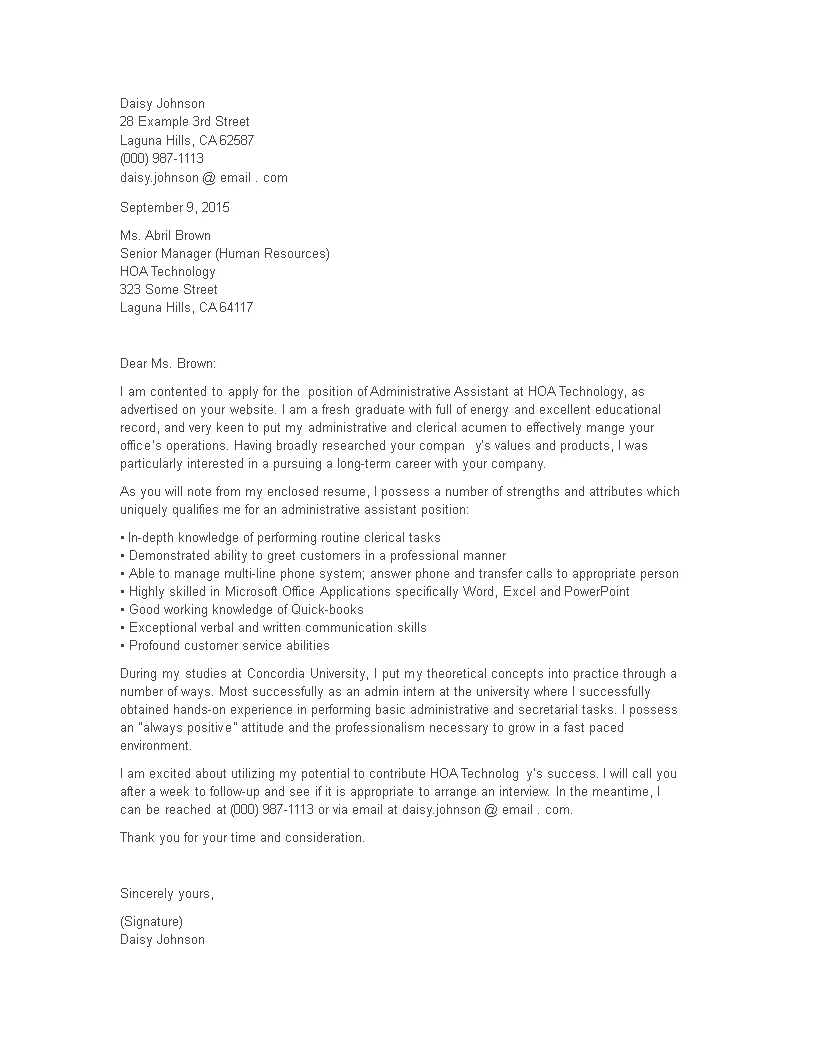
Conclude your cover letter with a strong closing paragraph that reiterates your interest in the position and expresses your confidence in your ability to contribute to the company. Include a call to action, such as requesting an interview or indicating your availability for a phone call. Thank the hiring manager for their time and consideration. Reiterate your contact information and express your eagerness to discuss your qualifications further. A well-crafted closing paragraph reinforces your key strengths and leaves a lasting positive impression.
Proofreading and Editing
Before submitting your cover letter, thoroughly proofread and edit it. Errors in grammar, spelling, and punctuation can damage your credibility and make you appear unprofessional. Read your cover letter aloud to catch any awkward phrasing or grammatical errors. Use a spell checker and grammar checker, but don’t rely on them entirely. Have a friend or family member review your cover letter to provide a fresh perspective and identify any potential issues. Ensuring your cover letter is free of errors demonstrates your attention to detail and professionalism.
Common Mistakes to Avoid
Avoid common mistakes that can undermine your cover letter. Do not use a generic template without customizing it for each job. Avoid simply repeating information from your resume; instead, use the cover letter to provide context and elaborate on your experiences. Refrain from including irrelevant information or overly personal details. Don’t use slang, abbreviations, or casual language. Always proofread your cover letter carefully to eliminate any errors. By avoiding these common pitfalls, you can create a cover letter that makes a strong impression and helps you land the interview.
With the right preparation and attention to detail, your office assistant cover letter can be a powerful tool in your job search. By showcasing your skills, experiences, and enthusiasm, you can impress hiring managers and increase your chances of securing an interview. Remember to tailor your cover letter to each job, highlighting your strengths and demonstrating your genuine interest in the company. Good luck with your job search!
